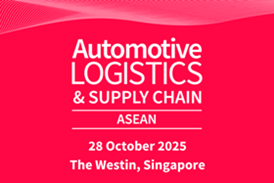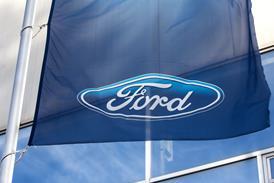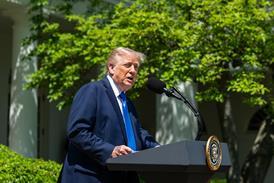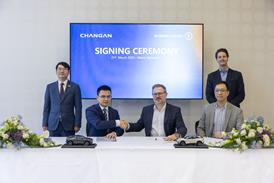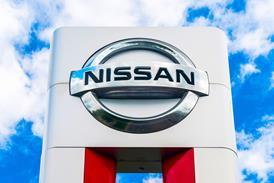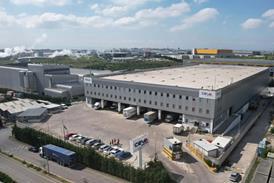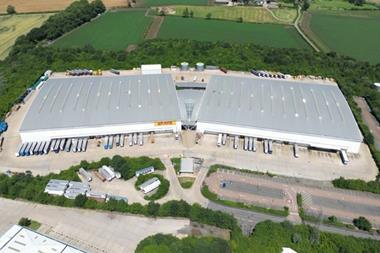Fresh insights into prime minister Theresa May’s plans for the UK’s exit from the European Union have reignited concerns over just what deal can be struck and what terms of international trade will apply...
 Confirmation this week by UK prime minister Theresa May (pictured) that the country would leave the European single market and customs union to seek its own free trade deals has prompted calls by the local car industry for government to avoid a ‘cliff-edge’ exit ‘at all costs’.
Confirmation this week by UK prime minister Theresa May (pictured) that the country would leave the European single market and customs union to seek its own free trade deals has prompted calls by the local car industry for government to avoid a ‘cliff-edge’ exit ‘at all costs’.
In her speech at Lancaster House in London on Tuesday January 17th, May repeated statements from her Conservative party conference in September that control over immigration and jurisdiction over laws and regulations would take priority over membership of the single market, when negotiations with Europe begin in coming months.
After the country voted to leave the European Union in a referendum in June last year, there was some speculation that the government may initially attempt to negotiate more control over its immigration and legal affairs but somehow remain part of the single market under a ‘soft Brexit’ scenario.
“What I am proposing cannot mean membership of the single market,” said May in her speech in London, adding that government would seek to replace the tariff-free regime that it currently operates under with a “a comprehensive, bold and ambitious free trade agreement with the European Union.”
May also said the UK would leave the European customs union, which removes trading barriers and paperwork across the wider EU and Turkey, so that it might negotiate trade agreements with other countries once out of the single market. She singled out China, Brazil, the Gulf States, Australia, New Zealand and India among countries interested in a trade deal with the UK.
She also mentioned US president-elect Donald Trump’s recent quotes saying Britain was not “at the back of the queue” for a trade deal with the world’s biggest economy, but at the front of the line (read more about Trump's comments).
The US was the single biggest destination for UK vehicle exports after the EU in 2015, although it was much smaller than the EU as an export market.
Under EU rules, the UK cannot officially begin negotiations for trade deals with other countries while it is still a member of the European Union, a restriction the British government has confirmed it will respect. The country is not expected to formally leave the EU before 2019.
To avoid disruption to existing firms – including the car industry, whose supply chains are deeply interwoven across Europe – May put forward the possibility of agreeing a new kind of associate membership to the customs union.
“I do want us to have a customs agreement with the EU. Whether that means we must reach a completely new customs agreement, become an associate member of the Customs Union in some way, or remain a signatory to some elements of it, I hold no preconceived position,” said May.
Uncertainty lingersWhile May’s speech was greeted with some positive reaction, including on the currency markets, the response to it across the automotive and logistics industries has been muted, with concern over continuing uncertainty in trade terms.
Mike Hawes, chief executive of the UK’s Society of Motor Manufacturers and Traders (SMMT), said in a statement following May’s speech that government would need to deliver a deal which included participation in the customs union and tariff-free trade, and avoided any non-tariff and regulatory barriers that would jeopardise investment.
“Achieving this will not be easy and we must, at all costs, avoid a cliff-edge and reversion to WTO tariffs, which would threaten the viability of the industry,” added Hawes.
BMW, which builds the Mini brand and engines in the UK, also issued a statement urging access to the single market. "We acknowledge the prime minister’s announcements today and urge her to ensure the UK’s negotiations with the EU result in uncomplicated, tariff-free access to the EU single market in future," it said.

A BMW spokesperson in Munich, however, also told Automotive Logistics that the carmaker would be ready to adjust to future changes in necessary. “Adjustments, especially in logistics, are part of our daily life, whether in markets, taxes or from weather conditions,” he said.
The UK’s Freight Transport Association (FTA) supported May’s vision for a global Britain increasing trade with other countries through new free trade agreements as well as the vision of “frictionless” trade with the EU. However, it also highlighted that the country’s road transport industry is heavily reliant on EU nationals who work as drivers, warehouse operatives and in other key roles across the sector.
“The continued ability of FTA members to employ and recruit these key workers will be essential to their future business success and FTA will be seeking assurances that the government recognises and accommodates the essential needs of the logistics sector,” said an FTA statement.
The British International Freight Association (BIFA), meanwhile, criticised the speech for not providing more clarity on key issues surrounding the unwinding of the existing relationship with Europe and the proposed trade deal.
“Freight forwarding executives are none the wiser on the actual mechanics of Britain’s future trading relationships and how they might affect the freight forwarding sector. Will Customs reintroduce EU transaction border controls? Will the replacement for CHIEF (Customs Handling Import and Export Freight) go ahead and will the new system be able to handle the millions of extra transactions? How will controls on dual use items be managed?” asked BIFA in a statement.
Meanwhile, broker Fastlane International responded to May’s speech with a warning that exiting the EU Common External Tariff, which applies to the import of goods into Europe, would cost all UK businesses as much as £44 billion ($54 billion) and lead to excessive delays and red tape in logistics.
David Jinks, head of consumer research at Fastlane said: “Moving outside the EU’s Common External Tariff would mean the need to set our own tariff rates. That entails setting our own duties on 19,000 individual tariff codes across a huge variety of items.
“It’s a frightening scenario that could result in an increase in the cost of imports of around 20% – £44 billion on current UK business exports to the EU,” added Jinks.
Working out a bespoke customs agreementWhile May’s speech reflects a starting point for official negotiations rather than an end result, there was scepticism over how feasible and desirable some of the outcomes would be. Taking the UK out of the single market – defined by many as a ‘hard Brexit’ – sets up the UK to have more barriers to trade, and will thus require complex arrangements to ease them.
Bernardine Adkins, head of EU, trade and competition at law firm Gowling, questioned the degree to which a bespoke customs arrangement would be workable. She suggested that the example of non-EU member Turkey’s customs union agreement was an unfavourable one.
“This would never be an acceptable arrangement for the UK, as for example, in the case of Turkey, it doesn’t even have a seat at the table when external trade deals are being negotiated by the EU.”
The customs agreement is important both for smoothing logistics across Europe and for trade with Turkey and the UK. Ford, in particular, benefits from Turkey’s agreement, producing its Transit vans in the country for the EU and the global market, with Britain its largest market. At the 2016 Automotive Logistics UK conference, Ford Europe’s purchasing boss, Alan Draper, called for the UK to retain barrier-free trade across the customs union.
The setting of and adherence to international standards and regulations have also been highlighted as a potential issue post Brexit, especially in the context of new technologies such as autonomous driving, connected cars and electro-mobility, in which the British government has said the country should take a lead.
“She [Theresa May] talked about having domestic standards, but the car sector is a global sector, and for these new driverless cars you are going to be having to set standards in an international environment, as is the case with respect to mobile telecommunications,” said Adkins.
“So the UK automotive sector needs to make sure that it still has enough punching power in terms of international standard setting.”
Automotive in focusMay’s intentions suggest that she wants a bespoke deal, and not something ‘off the shelf’, such as Norway, Switzerland or Turkey’s existing arrangements. The automotive sector looks to be an important part of this new agreement for the UK; she directly referenced the sector when she said the free trade agreement could take on elements of the “single market arrangements” for certain sectors, like the “export of cars and lorries” or “the freedom to provide financial services across national borders”.
Adkins said: “This appears to suggest that she is considering tariff-free trade between the EU and UK with respect to the automotive sector.”
 Earlier this year, Nissan announced a decision to invest further in the UK after a government commitment to ensure its Sunderland plant remained competitive
Earlier this year, Nissan announced a decision to invest further in the UK after a government commitment to ensure its Sunderland plant remained competitiveThis would be positive for the likes of Nissan, which post the referendum announced a decision to invest further in the UK following the government’s commitment to ensure its Sunderland plant remained competitive.
The carmaker told Automotive Logistics this week: “Nissan continues to work with the UK government to ensure the company’s long-term success and investment in the UK.”
The EU and UK automotive manufacturing sector is intrinsically linked via major cross border supply chains.
Recent analysis from the SMMT estimated that EU tariffs on cars alone could add at least £2.7 billion ($3.31 billion) a year to imports and £1.8 billion to exports under WTO regulations, which for the EU includes tariffs of around 10% for finished vehicles and 4% for components.
In 2015, 57.5% of all cars made in the UK were exported to the European continent; more than 70% of the UK’s vehicle imports, meanwhile, come from the EU, highlighting how important an orderly Brexit process is to players in the sector on both sides of the channel.
A smooth transition?May has previously indicated she would trigger Article 50 by the end of March, starting a two-year official negotiation period that can only been extended if all member states agree to it. No country has ever triggered article 50 before. Any period of limbo between this and an eventual deal could result in steep WTO regulated tariffs being applied.
May said that while it was in no-one’s interest for there to be a “cliff-edge” for business, the country would not seek “some form of unlimited transitional status” to alleviate this, describing it as “some kind of permanent political purgatory” that would do no good for either party. Instead, she wants to have reached an agreement on the future partnership by the time the two-year negotiation process has concluded.
“From that point onwards, we believe a phased process of implementation, in which both Britain and the EU institutions and member states prepare for the new arrangements that will exist between us, will be in our mutual self-interest. This will give businesses enough time to plan and prepare for those new arrangements,” she said.
These arrangements, she said, could be about immigration controls, customs systems and even the legal and regulatory framework for financial services.
“For each issue, the time we need to phase in the new arrangements may differ. Some might be introduced very quickly and some might take longer,” said May. “And the interim arrangements we rely upon are likely to be a matter of negotiation.”
May did warn, however, that if Britain felt it was not getting a good deal from the EU, she would be willing to take a harder approach, including changing Britain’s economic and tax model to make it more competitive while foregoing any trade deal at all. “A bad deal for Britain is worse than no deal at all,” she warned.
Adkins said a transitional period at the end of the negotiation period would be vitally important for sectors like the automotive industry.
“Theresa May notes that we don’t want to be in a state of ‘political purgatory’ but of greater importance for business is that there is an adequate transitional period for adaptation,” she said.
“I think there is a material chance of a cliff-edge if the government is not being realistic in terms of what can be achieved in any transitional period.”
"Achieving this will not be easy and we must, at all costs, avoid a cliff-edge and reversion to WTO tariffs, which would threaten the viability of the industry." - Mike Hawes, SMMT









